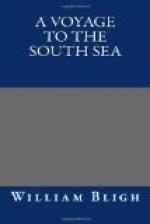The report of two cannon that were fired gave new life to everyone; and soon after we discovered two square-rigged vessels and a cutter at anchor to the eastward. We endeavoured to work to windward but were obliged to take to our oars again, having lost ground on each tack. We kept close to the shore and continued rowing till four o’clock when I brought to a grapnel and gave another allowance of bread and wine to all hands. As soon as we had rested a little we weighed again, and rowed till near daylight when we came to a grapnel off a small fort and town which the pilot told me was Coupang.
Among the things which the boatswain had thrown into the boat before we left the ship was a bundle of signal flags that had been used by the boats to show the depth of water in sounding; with these we had in the course of the passage made a small jack which I now hoisted in the main shrouds as a signal of distress, for I did not think proper to land without leave.
Soon after daybreak a soldier hailed us to land, which I immediately did among a crowd of Indians, and was agreeably surprised to meet with an English sailor who belonged to one of the vessels in the road. His captain he told me was the second person in the town; I therefore desired to be conducted to him as I was informed the governor was ill and could not then be spoken with.
Captain Spikerman received me with great humanity. I informed him of our distressed situation; and requested that care might be taken of those who were with me without delay. On which he gave directions for their immediate reception at his own house, and went himself to the governor to know at what time I could be permitted to see him, which was fixed to be at eleven o’clock.
I now desired my people to come on shore which was as much as some of them could do, being scarce able to walk: they however were helped to the house and found tea with bread and butter provided for their breakfast.
The abilities of a painter, perhaps, could seldom have been displayed to more advantage than in the delineation of the two groups of figures which at this time presented themselves to each other. An indifferent spectator would have been at a loss which most to admire, the eyes of famine sparkling at immediate relief, or the horror of their preservers at the sight of so many spectres, whose ghastly countenances, if the cause had been unknown, would rather have excited terror than pity. Our bodies were nothing but skin and bones, our limbs were full of sores, and we were clothed in rags: in this condition, with the tears of joy and gratitude flowing down our cheeks, the people of Timor beheld us with a mixture of horror, surprise, and pity.




